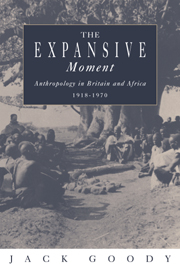Book contents
- Frontmatter
- Contents
- Introduction
- 1 The economic and organisational basis of British social anthropology in its formative period, 1930–1939: social reform in the colonies
- 2 Training for the field: the sorcerer's apprentices
- 3 Making it to the field as a Jew and a Red
- 4 Personal and intellectual friendships: Fortes and Evans-Pritchard
- 5 Personal and intellectual animosities: Evans-Pritchard, Malinowski and others
- 6 The Oxford Group
- 7 Some achievements of anthropology in Africa
- 8 Personal contributions
- 9 Concluding remarks
- Appendix 1 Changing research schemes
- Appendix 2 Towards the study of the history of social anthropology
- Notes
- List of references
- Index
9 - Concluding remarks
Published online by Cambridge University Press: 30 September 2009
- Frontmatter
- Contents
- Introduction
- 1 The economic and organisational basis of British social anthropology in its formative period, 1930–1939: social reform in the colonies
- 2 Training for the field: the sorcerer's apprentices
- 3 Making it to the field as a Jew and a Red
- 4 Personal and intellectual friendships: Fortes and Evans-Pritchard
- 5 Personal and intellectual animosities: Evans-Pritchard, Malinowski and others
- 6 The Oxford Group
- 7 Some achievements of anthropology in Africa
- 8 Personal contributions
- 9 Concluding remarks
- Appendix 1 Changing research schemes
- Appendix 2 Towards the study of the history of social anthropology
- Notes
- List of references
- Index
Summary
Before the 1930s social anthropology in Britain was taught in London (at the London School of Economics and University College), and at Oxford and Cambridge. In Scotland teaching only began in Edinburgh in 1946 with the appointment of a student of Malinowski, Ralph Piddington, as Reader. Sir James Frazer held a Chair in this subject at Liverpool in 1907 but remained there for only one term. Earlier Tylor had taught at Oxford and the zoologist Haddon at Cambridge. But serious professional teaching after the First World War began at Cambridge with Rivers (as a Lecturer in Psychology) and Radcliffe-Brown (as a Research Fellow) and at the same time with Malinowski (and Seligman) at the London School of Economics. Both Rivers (as psychologist) and Seligman (as a medical doctor) had been members of Haddon's expeditions to the Torres Straits at the end of the 1890s.
However, a critical mass of research students only emerged at the LSE under Malinowski at the end of the 1920s. That was the true birth of the subject in Britain, and it branched out slowly after the appointment of Radcliffe-Brown to Oxford in 1937. The end of the Second World War, after Malinowski's death, saw the emergence of Oxford as the main centre of research with the appointment of Evans-Pritchard to the Chair, of Fortes to a Readership and of Gluckman to a Lectureship. When Gluckman left for Manchester in 1950 and Fortes for Cambridge in 1951, those departments came to compete with Oxford and London for students and funds.
I myself am far from wedded to the criticism of comparative research and of their predecessors that marked the work of the group of anthropologists that followed Malinowski.
- Type
- Chapter
- Information
- The Expansive MomentThe rise of Social Anthropology in Britain and Africa 1918–1970, pp. 144 - 158Publisher: Cambridge University PressPrint publication year: 1995



